This issue has many photographs, so your email client may not handle it well. You can read it on the Substack website. Look for the post titled “Creativity, Spirituality, and Freedom” with a posting date of May 27, 2024.
Creativity, Spirituality, and Freedom
This is one of those essays I wrote just for me, to clarify my own thoughts, and as such publishing it feels like getting undressed in front of a window.
So why publish it?
We all have culture war fatigue these days. The battles we are fighting are important and necessary and if we lose them very little else will matter.
But that doesn’t mean that we can afford to lose sight of everything else. When the culture wars are won, we need to still be recognizable versions of ourselves, fully functioning people who are able to appreciate beauty and reflect on all the things that are neither Woke nor anti-Woke, but simply human.
So I’m taking what feels like a giant risk (though I acknowledge that this is just a feeling) to try to, in a small way, be the change I want to see in the world—more people opening up about what’s positive, beautiful, good, and helpful.
I am also publishing this as a conscious act of gratitude, to creativity and to the universe for making creativity available to humans—and yes, I acknowledge that I may be wrong, and it may in fact be a Creator I am thanking.
This moment is one of gratitude on a level I rarely reach, because some things in my (professional) life are uncertain and rapidly changing in a way that is profoundly terrifying. The practice of creativity is the only reason I’m within shouting distance of my right mind, and I am very grateful.
My Spring 2024 Miracle
Spring seems to be my season for medical miracles. About a year ago, I got a total cure for my vertigo. You can read about that here. And yes, it’s been permanent. Not a single vertigo attack since.
My most recent medical miracle has meant, for the last month or so, that I’ve been able to be much more prolific with one of my favorite creative endeavors — drawing — than in a very long time.
This has caused many positive changes in my life, some of them very surprising and far-reaching. It reminds me of a game I played when I was a little girl, skipping rocks across a pond and trying to guess how many ripples I would be able to count.
The ripples resulting from increased creative practice are much deeper than the surface of a pond, and I am noticing new ones all the time.
Creativity seems, to me, to be so deeply intertwined with both spirituality and freedom that while they have different aspects they may not be fully separable concepts, like “love” and “affection.”
Creativity, spirituality, and freedom are very big ideas, so let’s start with definitions.
What Is Creativity?
For “creativity,” I think the dictionary definition misses something.
I regard many pursuits as creative that don’t necessarily involve imagination or original ideas, because they are quite literally creating something. Perhaps a project like building a LEGO creation from the directions isn’t purely creative in the dictionary sense, but I find that surrounding myself with, for example, LEGO flowers adds a creative flair to my surroundings and my day. I rarely let new people into my space, but on those unusual occasions it’s always a great joy to see them figure out that my flowers aren’t the sort of flowers they were expecting.
For “spirituality,” the Oxford dictionary gives us this:
“Spirituality,” to me, means something pretty close to this definition. When a person is directing her energy to being present in the moment, to striving for virtue of character and moral improvement, establishing a conscious understanding of her place in the universe, improving that place, and to the pursuit of contentment, peace, and tranquility — through meditation, reflection, personal growth, etc., not material prosperity — she is oriented towards/engaging in spirituality as I define the term.
For “freedom,” the Oxford dictonary tells us:
The primary hindrance to my own freedom is my own fear, so this definition is especially nice for what I want to reflect on here.
My Story About Drawing
The two types of creativity I have been practicing most lately are drawing and writing fiction.
My writing story is pretty simple: my childhood sucked, so I buried myself in books. Most voracious readers are at least competent writers. Then I went deaf and found that email was far more effective than the phone at getting things done. The more you read and write, the more you read and write, and over time I developed some facility and found I enjoyed it.
I’ve found that completing a drawing every day acts like paying tribute to a demon (or is it an angel?) who guards a room where I’m allowed to enter and work on my novel without fear. It’s been a wonderful month for progress there, and there’s not much else to tell.
My drawing story, though.
Heh. Where do I begin?
My right hand has been through some stuff.
I broke fingers on my right hand twice as a kid, doing stupid-kid-things. Besides the breaks, I had good reasons for being very angry as a kid, and no safe outlets for that anger, so I punched hard things from time to time, mostly trees. That was, in retrospect, a type of self-harm, a way of making me feel some kind of power over myself and locating myself in my body. Making myself feel sure that I was more than a ball of fury and pain trudging through the world in sneakers. As an adult, I broke two metacarpal bones blocking a front kick in a tae kwon do class. And I broke my wrist after falling on ice on Christmas morning 2021.
I developed post-traumatic arthritis after the most recent injury. (Yes, you may laugh at the irony: that there is such a thing, and that I of all people managed to get it.)
As a consequence of a deep, ongoing ache in my right hand that quickly got intolerable every time I tried to draw, I didn’t complete a “real” drawing for over a year. Every time I tried, my hand would get tired too fast and the pain would be too much.
Earlier this year, I gave in and decided to get a cortisone shot. I was nervous about it. Anytime a doctor says there are no side effects, my hackles go up. I’m also self-aware enough to know that if I adjust to not being in pain, my ability to tolerate the pain in the future, if need be, will be dramatically lessened.
But I really missed drawing, so I decided to try.
The shot was painful to the point of making me disassociate: a very large needle going into a very small spot in between two bones in my hand. But a couple of hours later, when the pain of the shot had faded, a miracle had occurred.
I could draw again, for as long as I wanted.
It’s been a mind-boggling experience, one that I still sometimes can hardly believe is real. I thought I had lost drawing forever. I had resigned myself to making do with learning some digital drawing systems (where the pressure and grip on a stylus can be customized), and trying to pretend I didn’t miss drawing in an analog way. Trying to pretend I wasn’t angry about one more loss (a pretense my therapist, to his everlasting credit, called me out on regularly.)
I’ve completed a drawing almost every day for awhile now. Here are a few recent pictures:
(And yes, I take commissions, including to do people and pet portraits. Samples and guidelines for that are here.)
Creativity as a Spiritual Practice
“Spiritual practice” is a phrase that typically brings to mind things like prayer, meditation, and studying the ancient texts of the various religions and wisdom traditions.
I think creativity is a spiritual practice, too. Or, at least, it can be.
Meditation is a conscious practice of being present in the moment. The sort I most typically practice, zazen, uses the breath as the object of focus, with the goal of nonjudgmental awareness. Finding the time, space, and peace to focus on one breath at a time, and then letting awareness be what it is without attaching to notions of “good” and “bad” and “I like this” and “I hate this”, especially when the awareness is of oneself — this is a deeply spiritual practice.
It makes me aware of both my frailty and my power, of how inconsequential I am, as well as how important my choices are.
Nobody is going to rescue me, and in every moment I am choosing my experience.
As my therapist reminds me constantly, “You’re an adult now. You were shaped by terrible events you had no power over, but you have the power now and you are now choosing your life.”
Meditation is hard for everyone (and if anyone tells you it isn’t, he or she should not be trusted). The moments of truly nonjudgmental awareness, if they were counted, would be vastly outnumbered by the moments of counting breaths that are more like: “Seven…..I’m so sick of myself and the way I always, no, that’s a judgment, I’m not helping myself with these judgments, I need to just see myself with at least an attempt at compassion, what breath was I on oh I can’t remember ok I’ll just start over at….one.”
“He insulted me, he struck me, he cheated me, he robbed me”: those caught in resentful thoughts never find peace.
“He insulted me, he struck me, he cheated me, he robbed me”: those who give up resentful thoughts surely find peace.”
—from the Twin Verses section of the Dhammapada
Making something is an ongoing process of paying attention. In drawing, it’s noticing where the lines and shadows are, how they’re affected by the light. In acting, it’s feeling what the character feels. In other types of creativity, it’s other types of attention, but it’s always about paying attention.
When a human is absorbed in a creative pursuit, it is very much like meditation. There are wonderful, glorious moments of flow, of total absorption in the present, of bringing to life a vision from the mind’s eye, of deeply and genuinely enjoying being alive, of embodying joy through the freedom expressed by creating. There are also moments of frustration and struggle to get back to that peak state, which can only be achieved by ceasing to try and remaining present with the work in the moment, even when it’s hard.
Creativity is, I think, a type of meditation-in-movement, and one that is probably more accessible for most Westerners than the sitting-on-a-cushion-counting-breaths sort.
“Survival lies in sanity, and sanity lies in paying attention...the capacity for delight is the gift of paying attention.”
—Julia Cameron, in The Artist’s Way
The Fallacy of “Talent”
Many people think that creativity is only expressed in traditional art forms — painting, drawing, writing fiction, perhaps acting or playing music. They don’t do any of these things. Often they tried when they were younger and either didn’t do as well as they thought they should, or were shamed by a parent or teacher, and gave up. They decide they aren’t creative and that’s that. Creativity is a gift that some people have, but not them.
I have heard this argument from women whose homemade pies would put any professional bakery to shame and from men whose homes are furnished with shelves, tables, and chairs they crafted with their own hands.
I have heard it from an insecure teenager who felt that her failure to make the school play or win an art show meant that she was not creative. Meanwhile, she earns money every weekend as babysitter to children who repeat the bedtime stories she makes up over and over and can’t wait to hear the next installment.
Talent (dictionary: “natural aptitude or skill”) is a thing, sure. Yes. Of course it is. But it comes in many forms, sometimes hidden ones.
It is also utterly unnecessary.
I desperately wanted to draw all through my childhood and never managed more than stick figures. The drawings you see here are the result of YouTube videos, books, and practice. They are not the result of any aptitude I was born with. Drawing is a learnable skill. So are all the other creative arts.
A person born with talent might have a higher ceiling on what he or she can accomplish in a particular area, but so what?
So many people are so terrified to try that just trying—being willing to try to find one’s personal ceiling—will almost always result in a greater, and often much greater, level of creative freedom and success than the person just finding the courage to try can possibly imagine.
Creativity is a Human Birthright
Many things should be a human birthright that really aren’t. Not everyone is loved by his or her parents. Not everyone is encouraged and supported. Not everyone is given challenges and the opportunity to grow. Not everyone is given the gift of appropriate discipline and timely intervention.
But creativity is one human birthright that everyone can, and should, access.
This is one of the very few things that I believe with total certainty.
Creativity Increases Autonomy
My apartment is neat, clean, and organized far beyond the norm.
I have said a few times that if the local operating theatres ever are full and they need to do surgery somewhere else, my apartment could be transformed into one in about thirty minutes. People think I’m kidding, but as my friend
has verified for me on social media more than once, I’m not.Why do I live this way?
It started as a trauma reaction. My childhood home was filthy, and living in beauty, neatness, and order was a way of constant self-soothing. It provided me with constant evidence that the past was over.
I won’t claim that there are no more elements of that trauma reaction; that’s impossible for me to judge. I do think it’s not primarily about that anymore, though.
Now, I think, it’s mostly that I just like it. I like walking around my home and seeing beauty. I like knowing that there’s a place for everything and everything is in its place. I like the sense of peace it provides, and the way it reminds me that I am in charge of many aspects of my own life and experience—many more than ever before.
I cannot control the horror of what’s happening at my job, but I can control whether my apartment smells nice, is dust-free, and makes me feel safe. I can control these and many more things.
When life is harder than usual, an ongoing creative practice, even a small one, is likewise a profound source of autonomy and power, of evidence that one is not helpless or powerless.
I knew this on some intellectual level, but I know it on a much deeper level now that I am experiencing it so powerfully. My usual demons—depression, anxiety, and a few others—are still with me and still present challenges, but the fact that they cannot stop me from drawing is an immensely powerful weapon against them.
I cannot choose my feelings, but I can choose my attitude and my actions.
Practicing creativity is a way of taking that truth and putting it into action in a way that, like my neat apartment, produces immediate and tangible evidence.
It is significantly easier to believe, and to act on the truth, that you have more power than your feelings tell you that have, when you’ve used some of that power to make something.
“The last of the human freedoms: to choose one's attitude in any given set of circumstances, to choose one's own way. And there were always choices to make. Every day, every hour, offered the opportunity to make a decision, a decision which determined whether you would or would not submit to those powers which threatened to rob you of your very self, your inner freedom; which determined whether or not you become the plaything to circumstance, renouncing freedom and dignity...”
— from Man’s Search for Meaning, by Viktor Frankl
Creativity Is Armor For When Things Suck
To make a very long, complex story short and simple, I (a data scientist) recently refused to shade my findings in a way that a jerk at my job, who outranks me, wanted me to. And now my job is in jeopardy. I’m fighting, and job-hunting, but I’m also quite scared. Having only three years of experience gets me algorithmically screened out before a human sees my resume much of the time, and I have so prioritized paying off my student loans that I don’t have nearly enough in savings. Nor did I know, until this came up, how much trouble I would be in if I lost my insurance. (Therapy, physical therapy on my hand, regular audiologist visits, regular bloodwork for other reasons, the list goes on….).
I checked, and it turns out that paying for COBRA to keep my insurance would be more than my rent, utilities, and groceries combined.
I’m scared. My nervous system is activated, I’m sleeping poorly, and my experience of the world is so heavily weighted towards bad people getting away with being bad that I’m not very optimistic.
But I am not helpless, and I am not without hope.
Today, I can control what I can control.
I can write. I can draw. I can sit down and make something and when I stand up something beautiful will exist that didn’t exist before.
My feelings of fear, pessimism, and dread do not have to control me.
I do not have to panic.
I can take deep breaths, stay in the moment, and continue to create.
That is my power, my joy, and my freedom to take charge of my own experience.
That is one gift of creative practice: to let the fears and other feelings wash over me like a wave, to sit down, and to be human in the best sense: to make something.
To perform an act of transformation.
To consciously decide that though “it” — whatever “it” may be—is not okay, I will be okay.
And I will be.







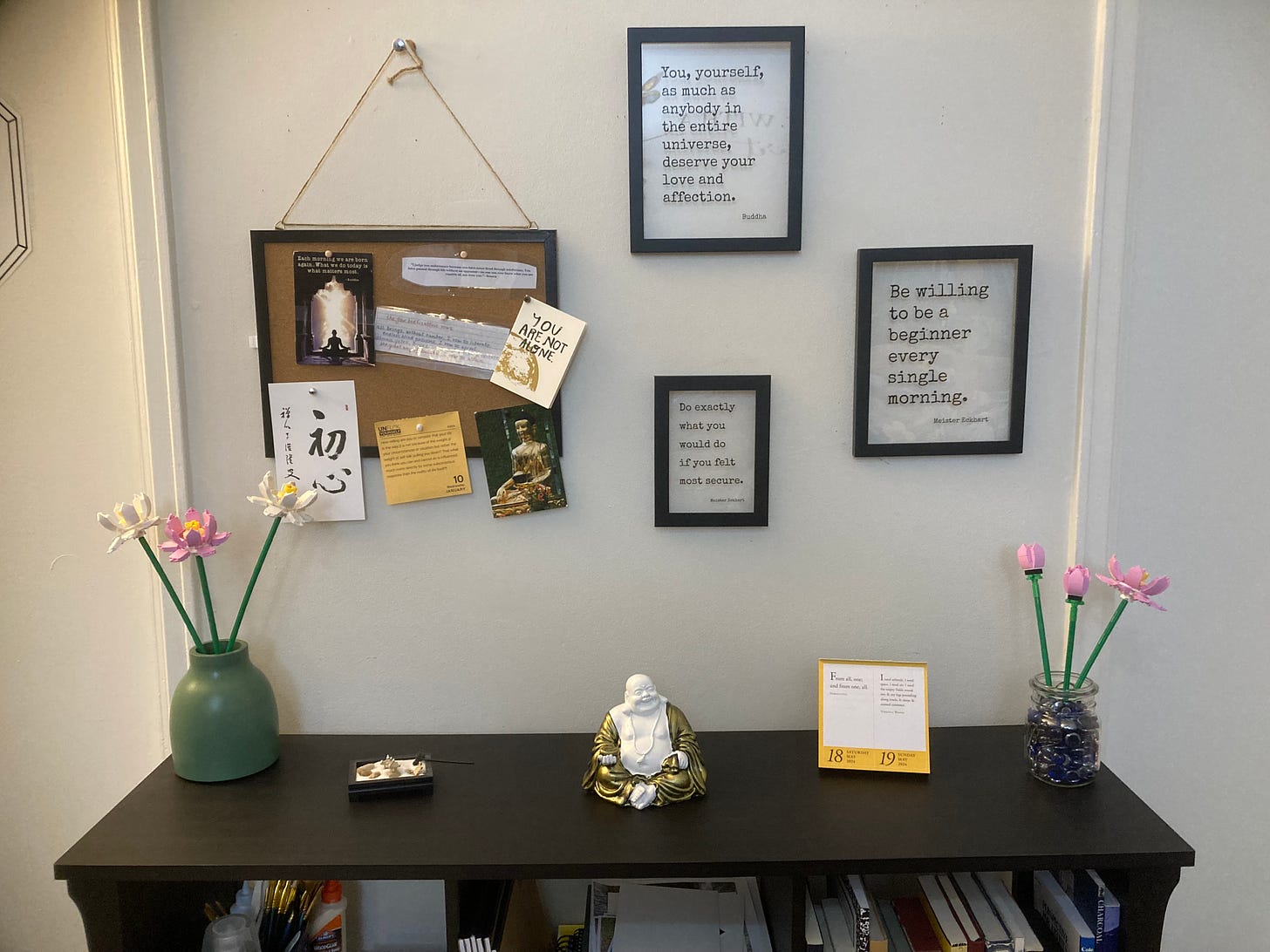


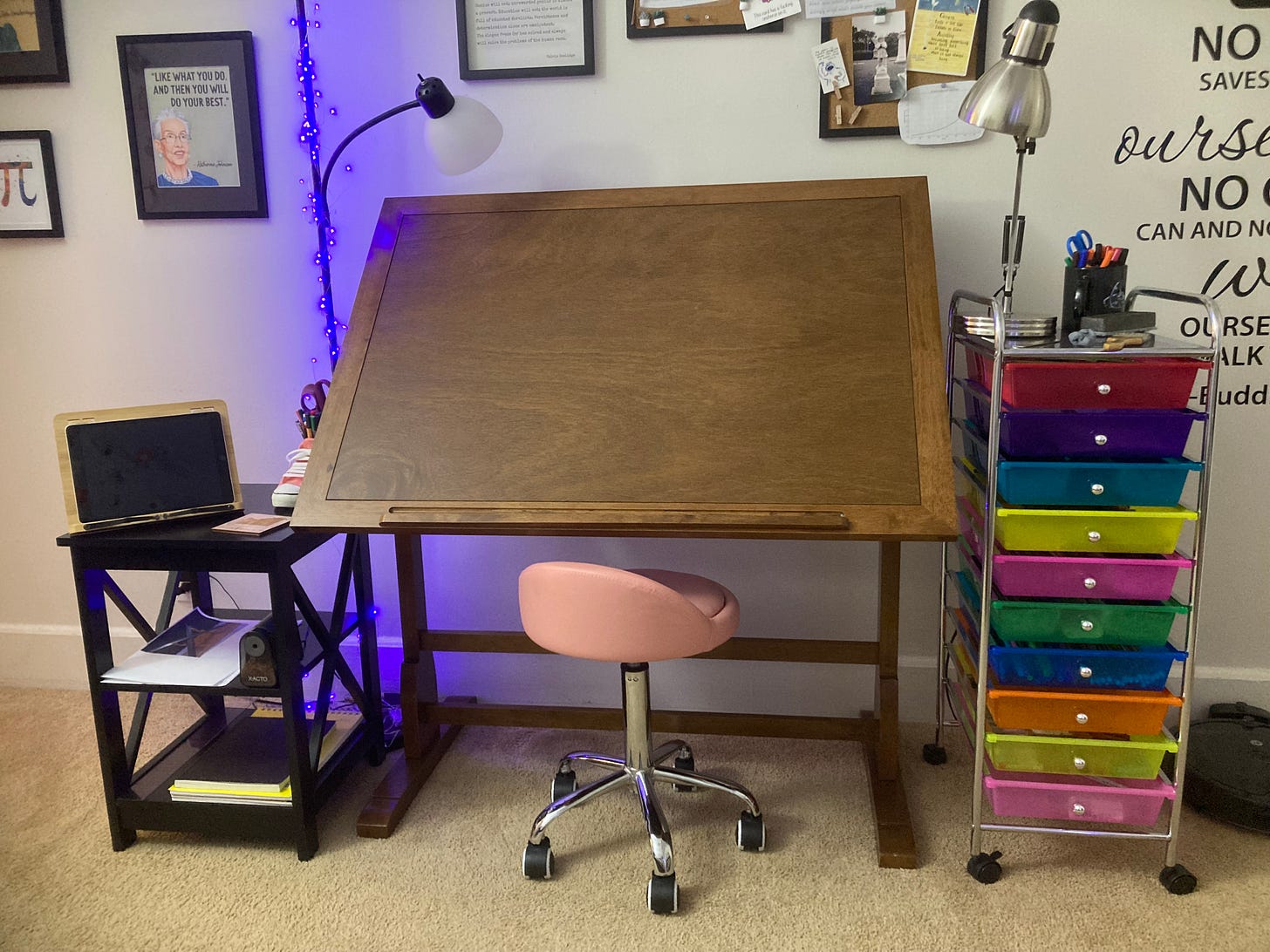
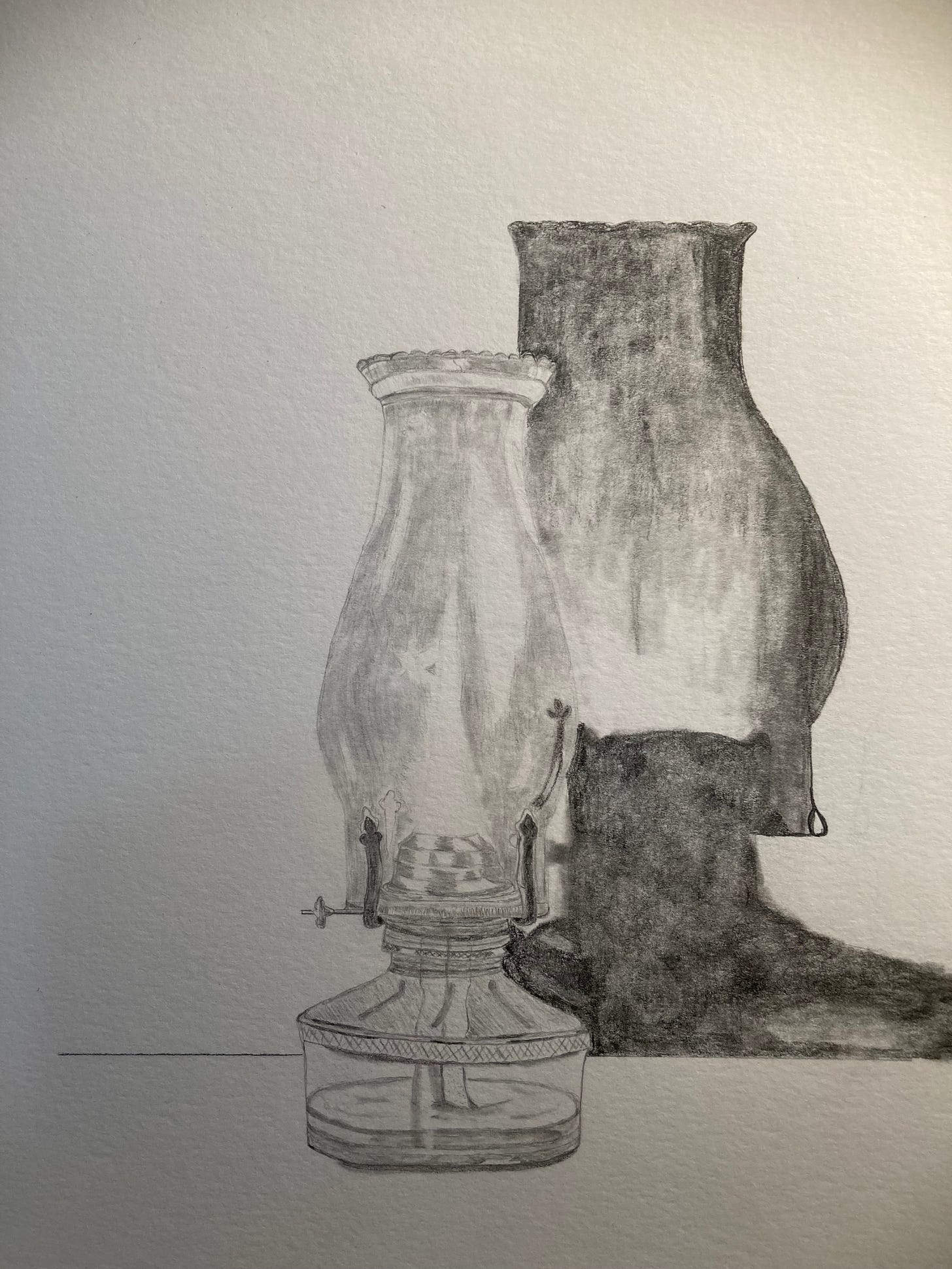
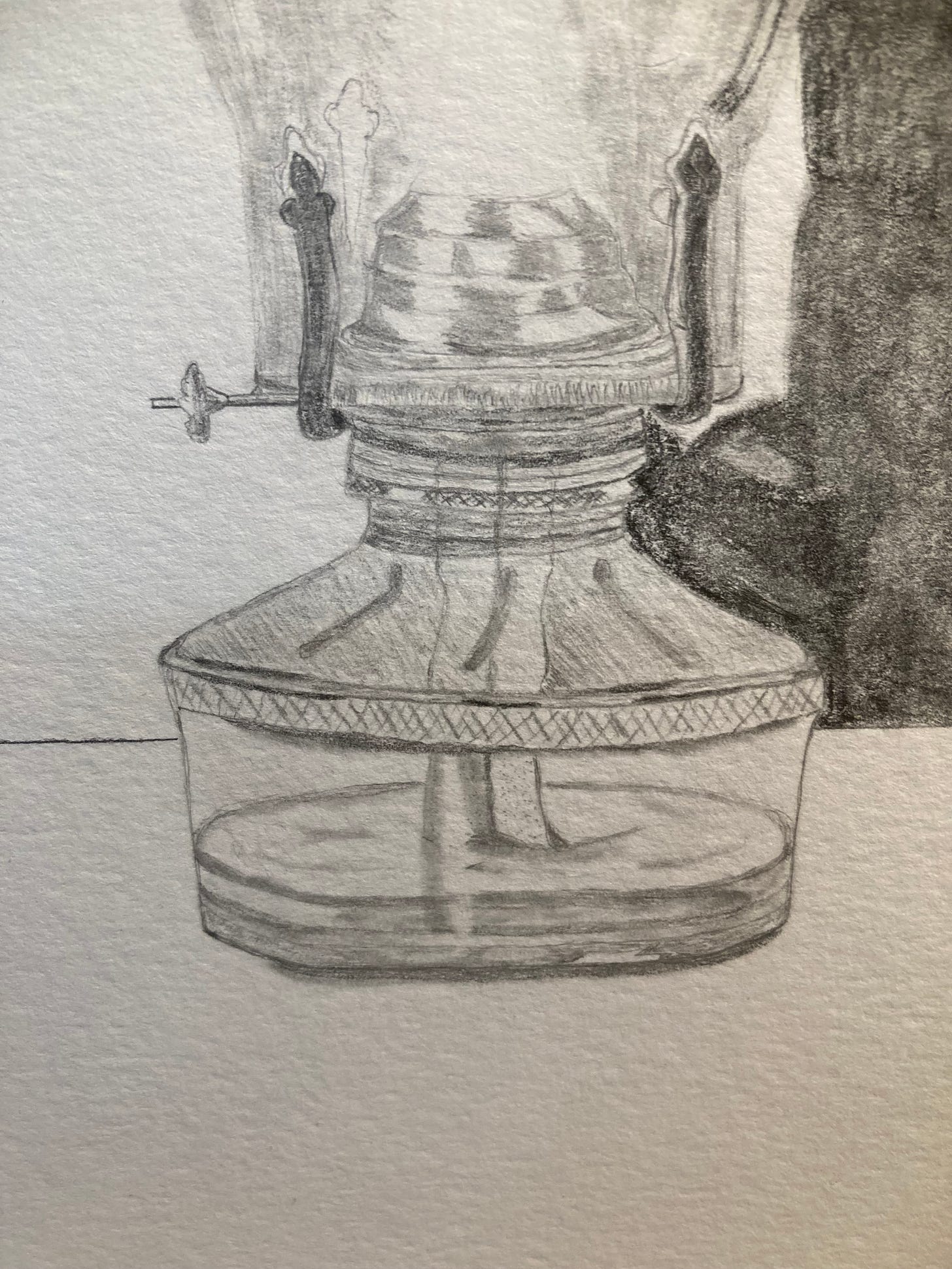



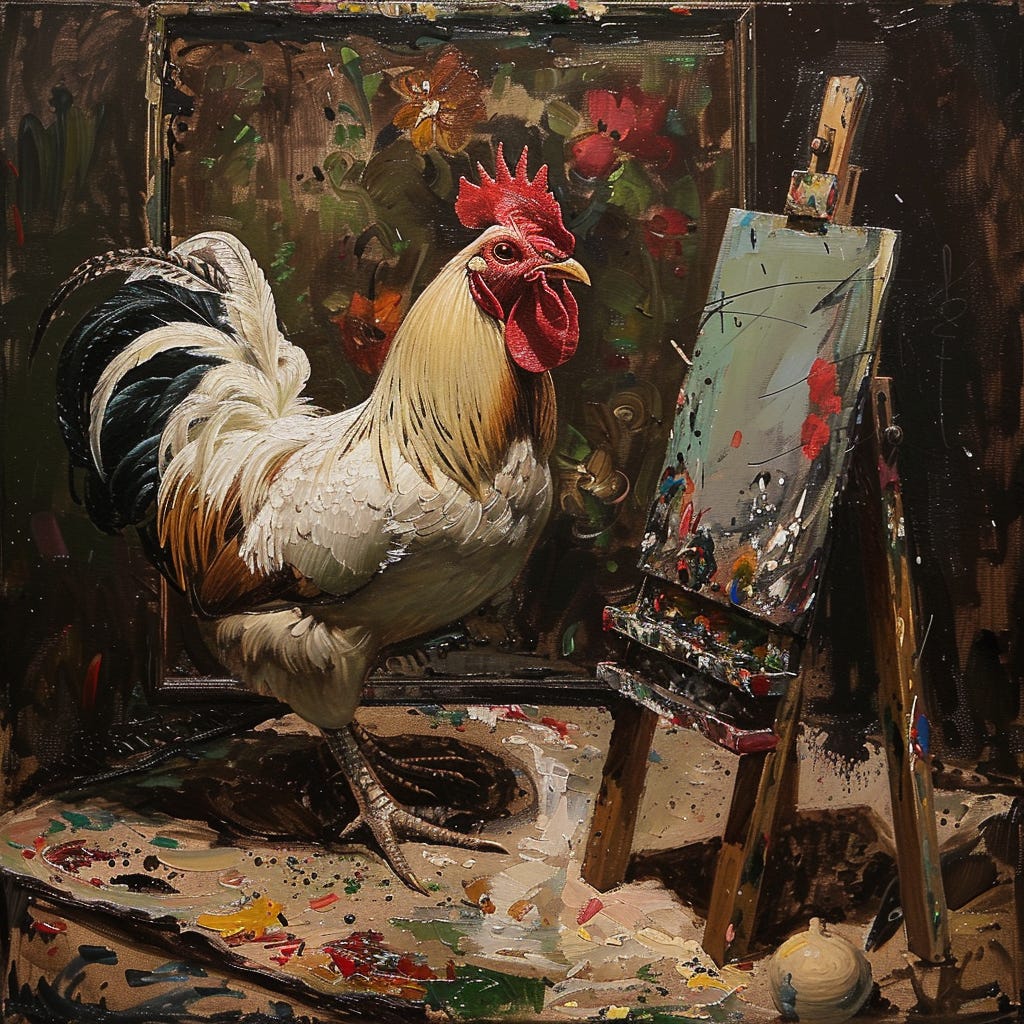



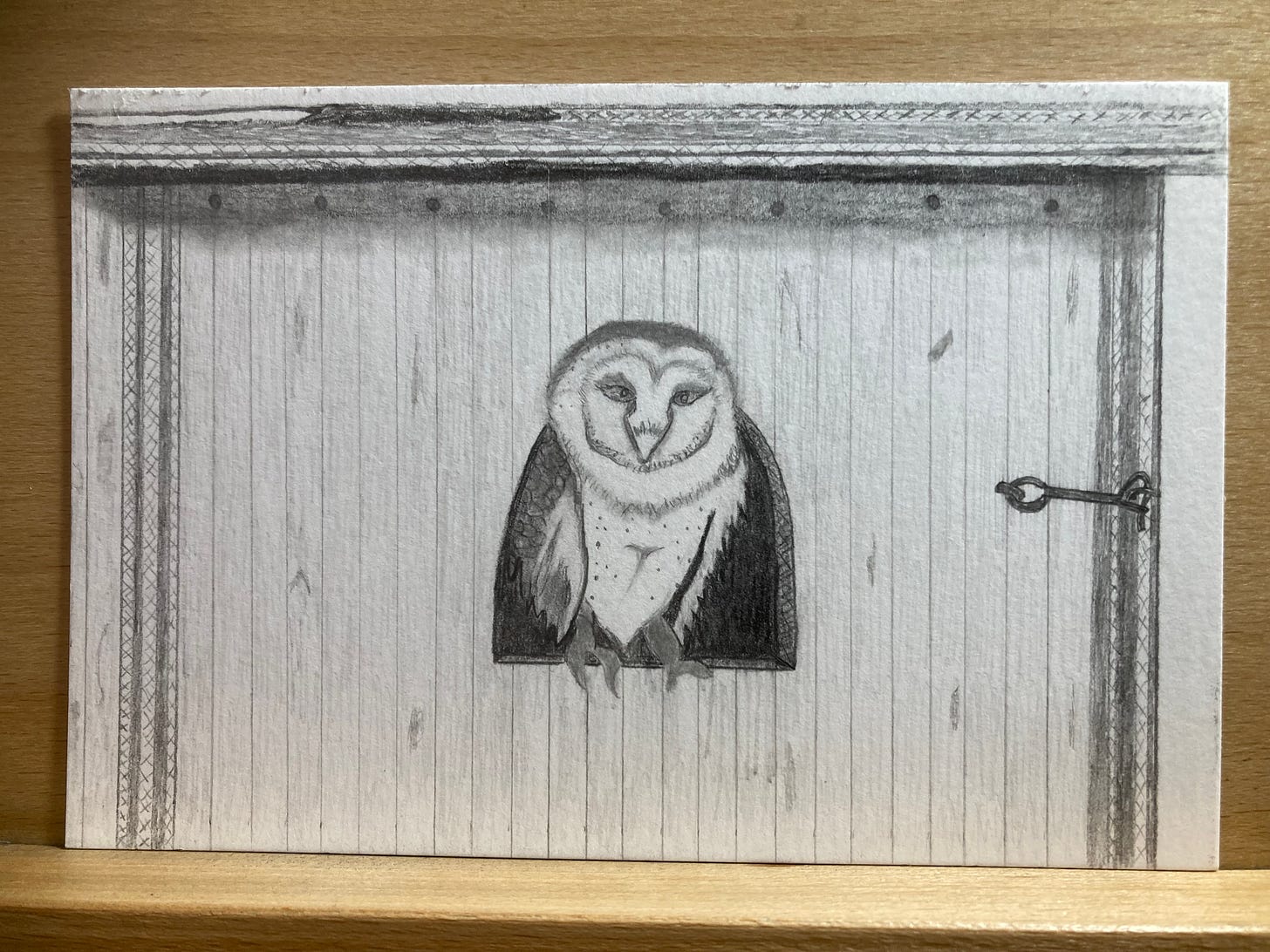

In this moment, I feel that the word that describes you best is one that I have thought about you before : Courageous.
You are clearly very courageous for all the reasons you mentioned here as well as others.
I’m happy for how you’ve made your life work. Especially because of all the obstacles you’ve overcome and are still overcoming.
Also I am scared for you; for what you can potentially face in the future.
And I am continuing to pray for you; always hoping for the very best of everything for you.
Once again you’ve proven that what is difficult, often beyond mere words, is possible to overcome. You’ve spoken in the beautiful voice of one that has walked a painful path and come out the other side without becoming monstrous. To say that I am overwhelmed sometimes with your simple honesty makes the words seem trite. I’ll certainly be praying for your job and whatever future adventure you embark on. I’m also glad that you have such a friend in Josh. A good friend is often a rock. Peace.